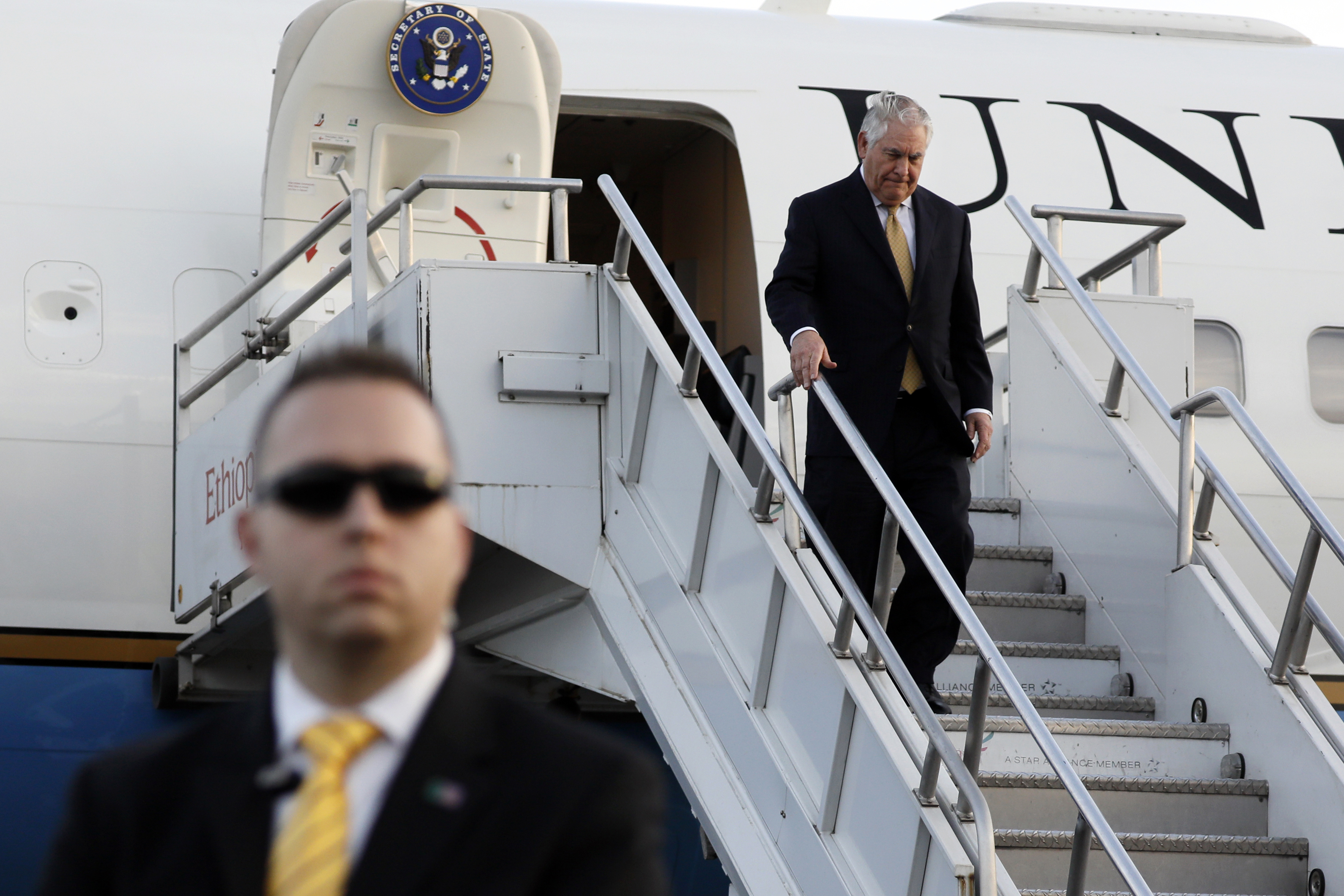
By JOSH LEDERMAN
Associated Press
ADDIS ABABA, Ethiopia (AP) — President Donald Trump hasn’t spoken much about Africa, and what he’s said has been far from flattering. It falls to his top diplomat, on his first official visit to the continent, to show the United States still cares. U.S. Secretary of State Rex Tillerson arrived at sunset Wednesday in Ethiopia’s capital, the initial stop on a five-country tour that will also take him to Djibouti and Kenya in the east before heading further west to
Chad and Nigeria.
He was greeted at the airport Addis Ababa on a red carpet by the Ethiopian foreign minister before taking a motorcade to his hotel. Complicating Tillerson’s mission is the vulgarity that Trump used about Africa during a White House meeting in January with U.S. lawmakers. Trump had questioned why the U.S. would accept more immigrants from Haiti and “shithole countries” in Africa as he rejected an immigration deal, according to one participant and to people briefed on the Oval Office conversation, who spoke on condition of anonymity because they weren’t authorized to publicly describe the discussion.
The slur was greeted with a mix of horror and outrage on a continent where many don’t know what to think about the U.S. president, or what he thinks of them. He’s rarely spoken about priorities for the continent, which garnered a mere seven paragraphs on the very last pages of Trump’s National Security Strategy. Tillerson will aim to mend that perception as he becomes the most senior U.S. official to set foot in Africa since Trump took office more than a year ago.
Tillerson, in a speech just before departing Washington, said Africa’s rapid economic growth and fast- rising populations mean its future is increasingly linked to America’s. He said the U.S. was committed to helping, but that prosperity and basic stability would be impossible until the security situation is brought under control.
“My firm belief is that there is ample opportunity on the continent for economic growth, for greater prosperity, and for responding to global challenges through mutually respectful partnerships,” Tillerson said. Tillerson is showing up with few concrete goals or new actions to announce for Africa, making his mission even harder.
Trump hasn’t announced a signature initiative to aid Africans, such as the PEPFAR program for HIV/AIDS that President George W. Bush started, and many of Trump’s budget cuts affect overseas programs that disproportionately help Africa. Tillerson did announce Tuesday $533 million in humanitarian aid to help with famine and conflict-related needs in Ethiopia, Somalia, South Sudan and Nigeria.
Listening may be the best approach for Tillerson. State Department officials said Tillerson wants to hear from leaders in Africa on way they’re most eager to collaborate with the United States. Trump has yet to name an assistant U.S. secretary of state for Africa or an ambassador to South Africa and other African nations. It was unclear how many opportunities Tillerson will have to engage substantively with leaders and African institutions such as the G5 Sahel joint counterterrorism force given the rapid pace and last-minute nature of his trip.
Among his stops:
—Ethiopia is under a state of emergency to control anti-government protests that the U.S. has criticized.
—in Djibouti, home to the only permanent U.S. military base in Africa, China’s development of its first overseas base just a few miles away has been cause for concern for the U.S., as is African nations’ growing indebtedness to Beijing, which is building infrastructure across the continent.
—in Kenya, the political system is in turmoil over disputes related to President Uhuru Kenyatta’s re- election. When opposition leader Raila Odinga held a mock inauguration, the government shut down TV stations and arrested opposition politicians, but the U.S. has largely voiced support for Kenyatta.
Meantime, the Trump administration has again reversed course on whether to let Americans import the body parts of African elephants shot for recreation. In November, after the U.S. Fish and Wildlife Service said it would lift the Obama-era ban, Trump intervened to keep it in place. But word emerged Tuesday that his administration would start approving elephant trophy importing on a “case-by-case” basis.



















